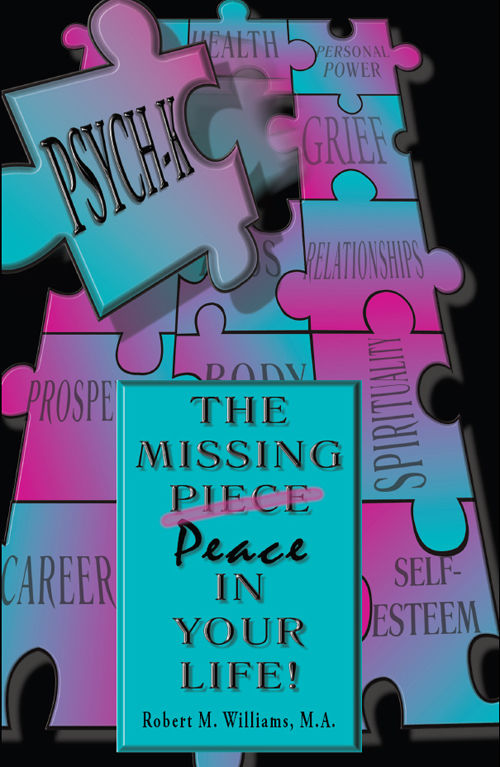PSYCH-K
The Missing

Peace
In
Your Life!
Robert M. Williams, M.A.
Third Edition
A Myrddin Publication

Copyright 2004-2009 by The Myrddin Corporation
All rights reserved. No part of this publication may be reproduced or transmitted in any form or by any means, electronic or mechanical, including photocopy, recording, or any information storage and retrieval system, without permission in writing from The Myrddin Corporation.
For information contact:
The Myrddin Corporation
P.O. Box 548, Crestone, CO 81131 www.psych-k.com
Library of Congress Control Number: 2004108873
Library of Congress Cataloging-In-Publication Data (CIP)
PSYCH-K The Missing Piece Peace in Your Life! / by Robert M. Williams
PSYCH-K is a registered trademark of the Myrddin Corporation
All Rights Reserved
ISBN 978-0-9759354-0-8
1. Self-Help 2. Psychology 3. Spirituality
Printed in the United States of America
This book is dedicated to the Divinity in each of us.
May you recognize your Divinity,
discover your greatness, and
become the peace you seek.
Peace is the key to
all knowledge,
all mystery,
all life.
From the Essene Gospels of Peace
Contents
Bruce H. Lipton, Ph.D.
Preface:
Trying Smarter, Not Harder
Introduction:
Making Wisdom a Habit Instead of an Effort
Chapter 1
The Roots of PSYCH-K
Chapter 2
When Getting There Isnt Half the Fun
Chapter 3
The Mind/Body Connection
Chapter 4
Whole-Brain Integration
Chapter 5
The Power and Biology of Beliefs
Chapter 6
Conscious vs. Subconscious Beliefs
Chapter 7
Putting It All Together
Chapter 8
Real People Real Results
Chapter 9
Testing Your Subconscious Beliefs
Chapter 10
The Myths About Change
Chapter 11
The Magic of Believing
Chapter 12
Its Just the Beginning
Afterword
PSYCH-K and the Big Picture
Foreword
The perception that our lives are controlled by our genes is so fundamental to our civilization, that this dogma is incorporated into the most elemental level of a childs education. The genes control life message is continuously repeated through every level of higher education, from grade school up through graduate and medical school. The general public has been conditioned to believe that the human body represents an exquisite genetically controlled automaton. In support of this belief, we attribute our abilities, and more importantly, our disabilities, to the character of our inherited gene codes.
Since genes apparently control the traits of an individuals life, and since we had no say in which genes we were provided at conception, we might rightly consider ourselves victims of heredity.
We have been programmed to accept that we are subservient to the power of our genes in creating the experience of our lives. The world is filled with people who are in constant fear that, on some unsuspecting day, their genes are going to turn on them. Consider the masses of people who perceive their genes as ticking time bombs, waiting for cancer, or some other life-threatening catastrophic disease to explode in their life. Millions of others attribute their failing health issues, such as cardiovascular disease, to inadequacies of their bodys biochemical mechanisms. Distraught parents readily blame unruly behavior on chemical imbalances in their childs brain.
The current mainstream scientific dogma insists that we are recipients of hand-me-down genetic codes that we are apparently unable to change. Consequently, we find ourselves not only victims of heredity, but powerless with regard to our ability to reprogram our fate. In assuming the role of powerless victims, we may rightfully deny responsibility for our ill health, both physical and mental. Unfortunately, this denial results in a tremendous amount of human suffering and disease.
So much for the bad news.
The good news is that, in fact, we are not victims of our genes. Astonishing advances in physics and cell biology have recently toppled the philosophical underpinnings of conventional biomedicine. A radically new understanding emerging at the cutting edge of cell science recognizes that the environment, and more specifically, our perception of the environment, directly controls our behavior and the activity of our genes. Since our perceptions may be accurate or inaccurate, we may more appropriately refer to them asbeliefs. Rather than your genes, it is your beliefs that control your biology.
The new advances in physics and biology lead us to a future of hope and self-determination. Rob Williams simple and profoundly empowering book sheds new light on an important shift in our understanding of the human mind and its affect on biology and behavior. The psychology of personal change presented in the following pages represents a giant step forward toward freeing ourselves from the limitations of outdated concepts about personal growth and development. It points the way toward becoming masters of our destiny instead of victims of our genes. When applied, these principles can dramatically accelerate the expression of our true nature as spiritual beings of unlimited potential.
Bruce H. Lipton, Ph.D. Cellular Biologist
Author of The Biology of Belief
___________________
For more information about Dr. Liptons publications and presentations, visit his web site at www.brucelipton.com.
Third Edition Update
S ince its inception in 1988, much has changed for PSYCH-K. In the beginning it was used primarily to address psychological obstacles to happiness among those individuals who were seeking a better life. It was often described as a psychological process that could be used to improve life, mentally and physically. It has been a popular tool for change with lay people and mental health care professionals alike. Over time it has evolved beyond its earlier designation, to reflect the evolving needs of humanity. The ever increasing awareness of the role of spirituality in our lives has become paramount. The fact that many people have discovered the use of PSYCH-K for accelerating ones spiritual evolution is fast becoming the most popular application of this amazing method for change. Hence, today PSYCH-K is popularly characterized as a spiritual process with psychological benefits. As the originator of PSYCH-K, I concur. I believe that in the final analysis, all problems are spiritual problems with physical side effects. The ability to change limiting beliefs that keep us from recognizing our Divinity, discovering our greatness, and becoming the peace we seek is the greatest gift of PSYCH-K for all who are ready to make the leap.
Together we can make a difference.

Originator of PSYCH-K

















